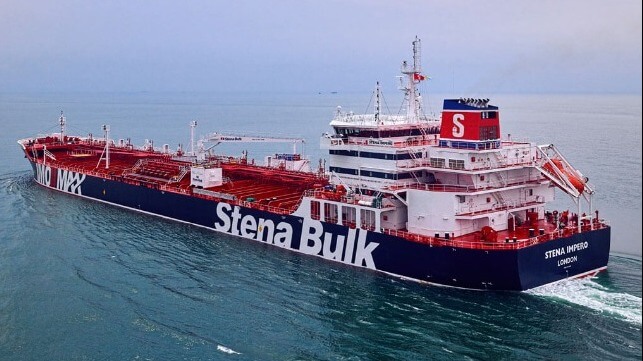Carbon Capture Study on MR Tanker Gets Go-Ahead from ABS

A consortium of global shipping organizations and the Oil and Gas Climate Initiative (OGCI) has received approval in principle from the American Bureau of Shipping for a demonstration project to use carbon capture on an oil tanker. The project aims to demonstrate the feasibility of technology aboard an MR tanker from Stena Bulk and would be one of the largest studies of its kind.
The project leaders, which includes Singapore’s Global Centre for Maritime Decarbonisation believe the onboard carbon capture system could help accelerate commercial deployment of shipboard carbon capture technology within the next five years. They said the granting of the AiP would allow the consortium to consider whether the project will move to the next stage, which includes engineering, procurement, and construction.
“The ABS’s approval in principle is a significant step forward for an important initiative to reduce emissions from shipping and demonstrates the value of collaborating across industries to develop decarbonization solutions,” said Michael Traver, head of OGCI’s Transport workstream. “As we move towards deployment, OGCI will continue to provide expertise on carbon capture to help our partners show the potential of the technology to meet ambitious decarbonization goals set by the maritime industry.”
The project’s seven-member consortium includes in addition to GCMD and OGCI, ABS, Stena Bulk, Alfa Laval, the Netherlands Organization for Applied Scientific Research (TNO), and Deltamarin. The two-year, three-phase demonstration project is investigating onboard capture and storage and offloading of captured carbon dioxide to address the operational challenges and opportunities of deploying carbon capture technology on ships.
Following a full engineering study, the carbon capture system will be built and tested before integration onboard a Stena Bulk medium range (MR) tanker for sea trials. A rigorous stage gate review process will be conducted before the progression between stages.
Stena Bulk currently operates a fleet of 38 MR tankers built over the last decade. The vessels are approximately 50,000 dwt. The 610-foot vessels are all equipped with 12 cargo tanks of a max 4,500 cubic meters capacity and can carry crude oil, products, and easy chemicals. Stena Bulk previously provided data to support the first phase of the project including key vessel technical information such as deck space, fuel use, and the availability of heat and energy in the exhaust stream.
During the initial studies, Stena Bulk and OGCI reported that the findings showed that LNG carriers offered the most straightforward path to implementing viable CCS because they had the right mix of onboard infrastructure. They said it appeared that Suezmax and MR tankers presented more technical challenges to implement a CCS system, but a full feasibility study was conducted based on the Suezmax tanker’s technical specifications because of the positive impact that a potential carbon capture and storage system would have, plus its ability to be representative of the global fleet. While they found cost challenges for the installation and operation, with storage tanks, compressors, and other equipment generating a large upfront CapEx cost, they said the results showed that carbon capture and storage is technically feasible on a large tanker.
The consortium began the first phase of Project REMARCCABLE (Realising Maritime Carbon Capture to demonstrate the Ability to Lower Emissions) in 2022, which involved the conceptual design and a front-end engineering design study of the carbon capture system. The second phase would include engineering, procurement, and construction of a prototype shipboard carbon capture system and onshore commissioning. Phase three focuses on integrating the carbon capture system with the MR tanker and conducting sea trials.
“We are excited that Project REMARCCABLE has obtained the approval in principle from ABS. This marks a significant project milestone and paves the way for the eventual shipboard installation of a scrubber and trialing it at sea,” said Professor Lynn Loo, CEO of GCMD.

that matters most
Get the latest maritime news delivered to your inbox daily.
GCMD in December 2022 also issued an invitation for proposals (IFP) to evaluate the safety, technical, and operational requirements for offloading shipboard-captured CO2 during port calls. The GCMD plans to launch this study on offloading the liquid carbon dioxide (CO2) to resolve potential challenges and inform the third phase of the project. The awardee for this portion will be announced in Q2 of 2023.
A non-profit started in August 2021, GCMD was founded with the support of industry leaders to aid in the development and testing of green solutions and shaping standards for future marine fuels. Last week, they announced that MSC has joined in a five-year commitment including financial support and participation with its vessels and vessel operating data. GCMD is also currently working on a project testing biofuel drop-in and the process for ammonia bunkering.
